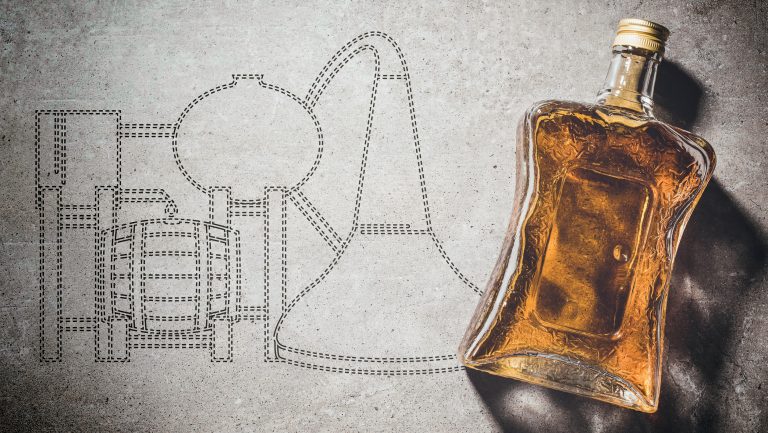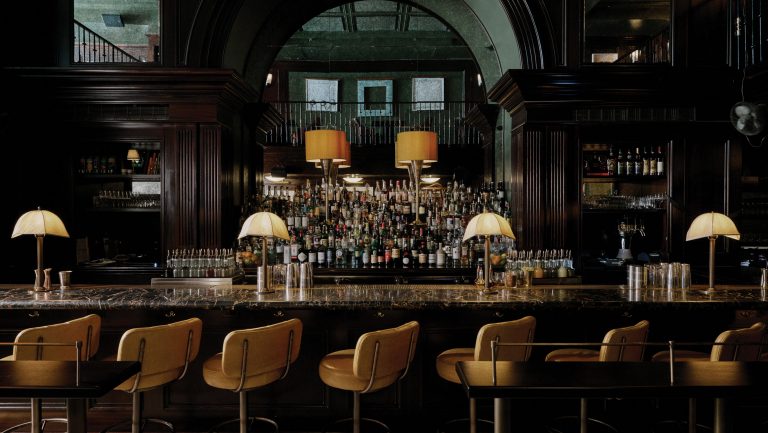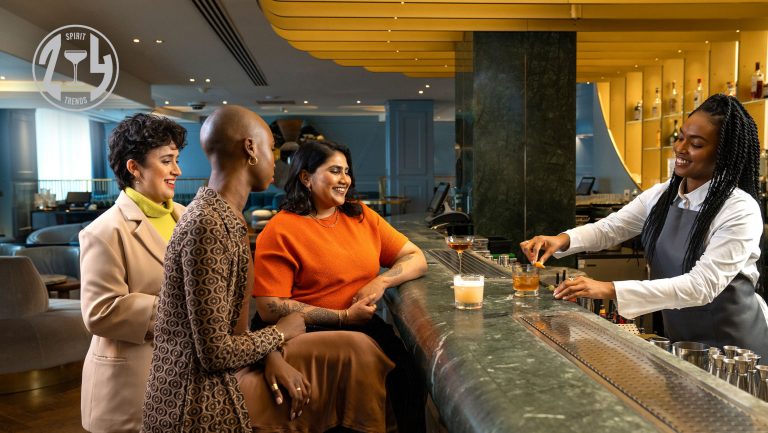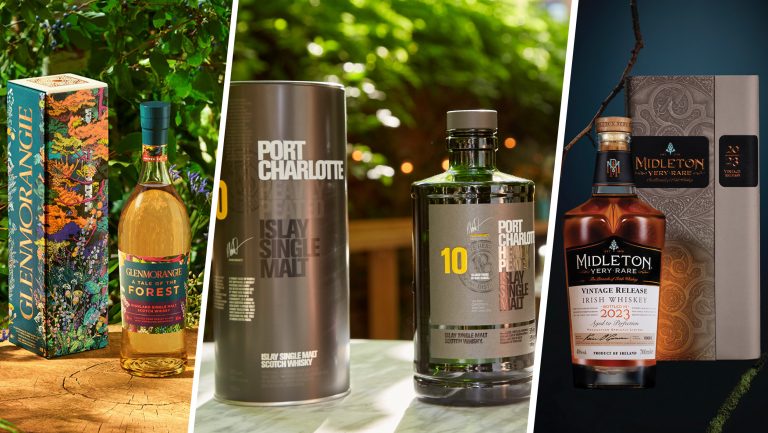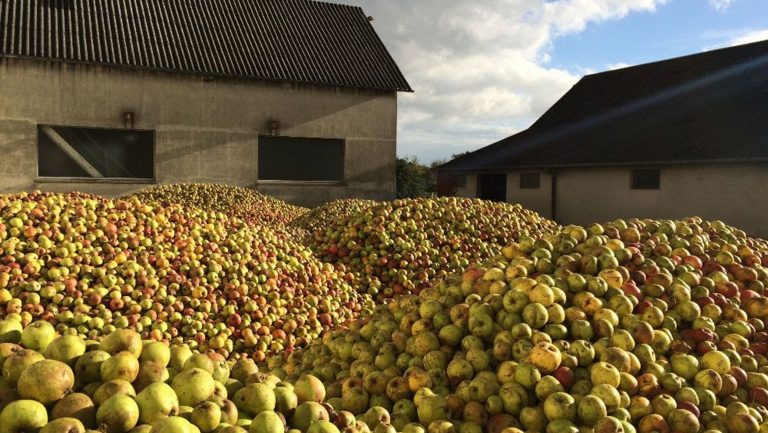“Many of the first American whiskey brands were created by companies without distilleries,” explains Noah Rothbaum, the author of The Art of American Whiskey. “The blend of sourced whiskeys is what was known, not the distilleries that produced them.” Not much has changed in that respect—today, companies both large and small are still buying sourced whiskey or blending the products of several distilleries that commonly remain unnamed on the label.
The number of distilleries, however, grows almost daily. More than 70 distilled spirits plant permits were issued by the Alcohol and Tobacco Tax and Trade Bureau in April 2018 alone. But as Rothbaum points out, a spirits producer doesn’t need a still or even a physical location to launch a brand. “The brand is largely where the value is,” says Malte Barnekow, the CEO of The 86 Company, which produces the brands Aylesbury Duck Vodka, Caña Brava Rum, Fords Gin, and Tequila Cabeza—all without a distillery of its own.
Starting a brand without a distillery can be fairly straightforward—and managed by just a few contracts—but there are several steps that need to be taken before the launch of a new label, including sourcing and developing the product, obtaining the proper federal and state licenses, putting a distribution model in place, and shoring up back-office administrative functions.

Don’t miss the latest drinks industry news and insights. Sign up for our award-winning newsletters and get insider intel, resources, and trends delivered to your inbox every week.
Creating the Concept
“We sought out [some of] the world’s best distillers of vodka, gin, rum, and tequila,” says Barnekow, noting that he and his team had the marketing know-how but wanted to leave the production to the experts. In the agave world, this is perhaps the rule more than the exception. Very few tequila and mezcal companies own their own facility but rather contract with a producer to create a spirit with their brand name.
The recent JAJA Tequila was launched by Elliot Tebele, the founder of the FuckJerry Instagram meme account and the Jerry Media platform, his brother Maurice, and Martin Hoffstein. Maurice Tebele, the president of JAJA Spirits, explains that the impetus to start the brand was, like Barnekow’s, driven by his group’s marketing expertise. “We know how to market in today’s landscape,” he says, “but [we] certainly came into this industry without any prior knowledge of producing tequila. Getting the tequila produced is the easy part.”
The first step in creating the concept is to decide on a spirits product and a brand story. Antonia Fattizzi, the president of Cork and Tin, a beverage industry branding agency, says that it’s also important to understand the brand’s target consumers and why the product will appeal to them. “Have a firm plan for where you intend to place the product and how it will be sold to customers,” she says, so that it doesn’t end up “sitting on shelves collecting dust.”
Fattizzi adds that because the market is saturated with spirits, new products need to solve problems and add value in the minds of trade professionals as well as consumers. For instance, bartenders or consumers who would like to create a cocktail with tequila and jalapeño can turn to a product like Tanteo Jalapeño Tequila, which is already infused with jalapeño, rather than flavoring the tequila (or cocktail) on its own and adding another step to their cocktail preparation. Tanteo Jalapeño not only offers a solution but a consistent flavor profile.
Developing the Product
Deciding what you want to bottle is, naturally, the biggest decision. You should contact a distillery and obtain samples. When speaking with distilleries, you should ask about their minimum order (you may want to start small, to test the waters, with just a couple hundred cases), how much lead time they need for future orders (you don’t want your product to be out of stock), payment terms, and whether they’ll bottle for you or just provide bulk spirits.
Midwest Grain Products (MGP), based in Atchison, Kansas, is one of the largest distilleries in the U.S.—and a major supplier of premium distilled spirits. The company has a four-barrel minimum for whiskey, or one tote for new distillate for whiskeys, gins, or grain neutral spirits. Barry Younkie, a beverage alcohol sales manager at MGP, explains that the distillery offers more than a dozen different mash bills that a customer can choose from as a starting point. “As part of the sample and formulation process,” he says, “MGP will also help a customer create a unique combination of their own by tailoring blends of our time-tested mash bills.”
If a customer wants to lay down product, or put product aside for aging, but wants to buy aged whiskey for an immediate supply, Younkie explains that MGP can sell product from “its aged inventory, while matching the mash bill for new distillate to ensure consistent product and a seamless transition in the years to come.”
If you work with a contract producer like MGP, you’ll have to find a distillery that will receive the bulk spirit from the contract producer and bottle it for you. Bottling ranges in price; it can cost anywhere from a few dollars to nearly $20 per case, though the higher range is often reserved for relationships in which the distillery is also providing the spirits.
Some distilleries do provide both the spirits and the bottling services. Many craft distillers around the country offer these types of custom services. The Miami Distilling Company, which produces Miami Club Rum and Miami Club Cuban Coffee Liqueur, is one such distiller. “In addition to our own rum,” says Miami Distilling’s owner, Matt Malone, “we also distill product for others under contract, which includes both distillation and bottling services.” Avi Aisenberg, the owner of South Florida Distillers in Fort Lauderdale, says that his company offers clients services to start a brand, including formulation and brand design, in addition to bottling.
Formation and Protecting Your Name
Prior to entering into an agreement with any distillery, the first step will be forming a company. Whether you form an LLC, S corp, or choose another corporate structure, you want to shield yourself and your partners from personal liability.
Keep in mind that the state costs of forming a corporate entity can change from state to state. New York, for instance, has a publication requirement for LLCs that can cost over $1,000 on its own. You may also choose to work with an attorney to draft documents, like an operating agreement for your LLC. Once the entity is formed, you’ll also want to register your trademarks.
Be sure to register your trademarks before you start working on your brand strategy. It makes no sense to spend thousands of dollars on a designer for your labels and marketing materials only to find out that another brand holds the trademark for the name you’ve chosen.
Engaging a Third-Party Compliance Company
You have a few choices for actually selling your product and making money from the sales. First, the bottler-distillery can sell your product under its licenses. You should have the appropriate federal and state licenses to receive the proceeds from the bottler’s sales. The next option is to obtain all the necessary federal and state licenses and buy the product from the bottler-distillery and resell it to various distributors, who will then sell the product to retailers. Finally, it’s common for those starting a spirits brand without a distillery to engage the services of a third-party compliance company, such as American Spirits Exchange, MHW, or Park Street. Compliance companies will receive the bottled spirits, warehouse them, and then sell them to the brand’s distributors around the country.
Working with a compliance company means you won’t have to take on as much of the administrative headache right out of the gate, and you’ll only need a federal permit. Most of these compliance companies also have wholesale permits in various states, such as California and New York, that allow you to “self-distribute” to retailers without having to try to persuade a big national distributor to agree to carry the brand-new product.
“We maintain the federal and state license infrastructure and manage the complex back-office administrative functions,” explains Harry Kohlmann, Park Street’s CEO. This enables the client to concentrate on product development, marketing, and street sales. Compliance companies like Park Street also offer solutions for working capital so the client has funds to run the day-to-day operations, as well as offering human resources management, accounting, and other services designed to handle the tasks most brand owners don’t want to deal with—or don’t yet have the bandwidth to manage on their own.
But Park Street and its ilk do not advise on state-by-state rules regarding the actual advertising and marketing of your products. As you begin to market your brand, you will have to stay mindful of the various rules and regulations governing marketing and sales, and this includes being aware of possible pay-to-play violations and slotting-fee schemes.
Once you’ve completed the process and the product is ready to sell, the rest is up to you. “That’s the fun part,” says The 86 Company’s Barnekow. “It’s also the hard part—but that’s what you signed up for.”
Editor’s note: Nothing in this article is intended to be—and should not be—construed as specific legal advice.

Dispatch
Sign up for our award-winning newsletter
Don’t miss the latest drinks industry news and insights—delivered to your inbox every week.
Ryan Malkin is principal attorney at Malkin Law, P.A., a law firm serving the alcohol beverage industry. Nothing in this article is intended to be and should not be construed as specific legal advice.

